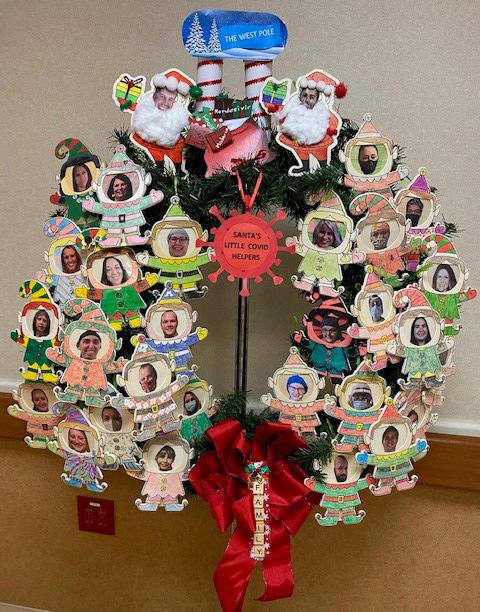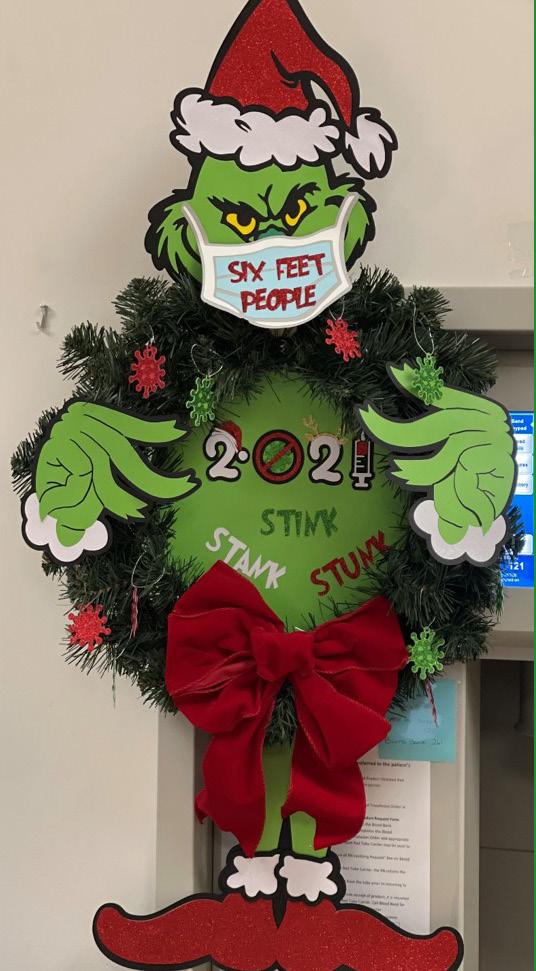
4 minute read
COVID Care Continues…
COVID-19 Response
Impact of ICU Incident Command System
Advertisement
Through early 2021, Summa Health extended the ICU Incident Command System, which was established in March 2020 in response to a projected a surge of patients who would require ICU level of care due to complications of the emerging COVID-19 virus. The system provides guidance for how to organize assets to respond to an incident and processes to manage the response through its successive stages. Led by Dr. Richard George, Trauma Medical Director, Summa Health’s team included Kyle Anderson MSN, RN, CCRN, NE-BC, MICU/SICU Unit Director, as Operations Section Chief and Kylene Mesaros MSN, APRN, ACCNS-AG, CCRN, Clinical Nurse Specialist, as Planning Section Chief. Other nursing participants included Brenda Kovacik MSN, RN, CCRN, NE-BC; Marty Muckley, MSN, RN; Dawn Troup MSN, APRN, ACCNS-AG, CCRN; Elizabeth Protain MSN, RN, CCRN-K; and Kelly Glendon MBA, BSN, RN, CNOR, among many others.
Interprofessional collaboration was key to the Summa Health Incident Command System’s success. Determining appropriate supplies, medications, and process for intubation of COVID+ patients required collaborative representation from physicians, respiratory therapy, nursing, infectious disease, pharmacy, distribution, and purchasing. Promoting and enforcing enhanced communication with the patient’s family members via alternative platforms also required collaborative representation from nursing, physicians, information technology and quality/data analysts. Some of its many other accomplishments included:
• Assessing inventory and allocation of equipment/supplies
• Evaluating pharmacological treatments for acute respiratory distress syndrome and COVID-19
• Creating a reference guide on Summa’s intranet for all critical care resources and documents
• Creating a COVID-19 Critical Care Procedure Manual
• Facilitate emergency privileges and education to non-ICU providers for ventilator management
The work of the ICU Incident Command System supported the Summa Health Nursing Professional Practice Model by incorporating leadership, knowledge and evidencebased practice, and the mission and values into advocacy and the interdisciplinary care team – in order to Care Beyond for our patients, nurses, families and community.
The final meeting of the ICU Incident Command System was held on March 3, 2021, when the decision was made to transition operational decision-making back to pre-pandemic processes. It was operational for nearly one year.
Re-Deployment of Surgical Services Nurses
As surges in COVID-19 cases continued to strain Summa Health and the healthcare industry in general, hospital and nursing leadership evaluated ways to address resource limitations, such as available hospital space, staffing and supplies. One of the solutions involved temporarily redeploying nurses from surgical services, whose volume had been reduced, to more hard-hit inpatient areas of the hospital.
“We had to reduce capacity in surgery due to inpatient bed constraints,” explains Glendon, who serves as Unit Director, Operating Room. “So with that reduction, we had some availability within our teams.”
While re-deploying to a new area wasn’t easy, surgical services staff rose to the challenge and served on the inpatient floors where they could provide the most help – sometimes for months at a time. “Even after the surges, surgical services continued to experience some ebbs and flows. If we had a reduced volume and didn’t need all the staff on a given day, we would call the nursing supervisors and offer support in others settings,” recalls Glendon. “Every single one of our team members at one point ended up working outside of the operating room and assisting on the floor.”
While the Summa Health surgical services nursing staff has since returned to a routine workflow, their efforts during the COVID surges have not been forgotten. “Our nursing staff found ways to really support the entire institution by transitioning roles temporarily to assist with the crisis,” says Glendon. “I cannot say enough about what they did to step up for the system.”
COVID-19 WellBeing Initiatives
Throughout 2021, COVID-19 care extended beyond Summa Health patients. Nursing leadership recognized the need to provide care for the frontline caregivers, whose physical and psychological health was being affected as well. As a result of the pandemic, COVID nurses were experiencing physical and emotional distress such as fear, anxiety, depression and stress, which can lead to burnout.
“The staff on the COVID floors was pretty isolated,” says Akron Campus 4 West Unit Director Cheryl Watson, BSN, RN, NE-BC. “All meetings were even online, so you didn’t go anywhere.”
To help promote the well-being of the COVID staff, Summa Health nursing leadership developed a series of COVID-19 well-being initiatives at both the Akron and Barberton Campuses. These initiatives included:

• Nursing leadership rounding with snack carts to help nurses re-group and re-charge

• Inspirational quotes and messages through email
• Cathartic events like “Fun February” with tropical décor, a Cinco de Mayo activity with piñatas and a holiday wreath competition
• Summa Health behavioral specialists providing complementary professional services
• Requests for Code Lavender, a crisis intervention tool, during high-stress days
“When Lorie [Rhine] and Brenda [Kovacik] came by with the snack cart, it offered a way for us to connect to the outside world,” says Watson. “They were just very kind to make sure that they took a moment to thank us.”
Tiffany Dillon, MSN, RN, CMSRN, NE-BC, Barberton Campus 4 South Unit Director, agrees. “The hospital was running at max capacity and the nurses were having a hard time getting away for a break, even just to take a drink or have a snack. So our nursing leadership – TJ [DeAngelis] and our unit directors – would do weekly rounds with snack carts. All the leaders went to every unit together, which I thought was nice. Our nurses were not seeing just one person, but a unified group of leaders.”
While the snack carts helped address physical needs, the Summa Health behavioral health team assisted in supporting the more psychological initiatives. “Dr. Banyasz came to our floor several times just to talk with us about what we were feeling and how we were doing,” shares Watson. “We learned a lot about ourselves and each other. It was just good to hear that we were all experiencing somewhat of the same thing – nobody had really talked about it before.”
While the COVID pandemic has brought many challenges, Summa Health nurses continue to look for the positive. “During that time, we became so close. And we’re still close,” continues Watson. “If we knew that the COVID crisis was coming again and we had to treat it here in Akron at the hospital, I don’t think I would change my experience. I’m so glad we did it together.”





